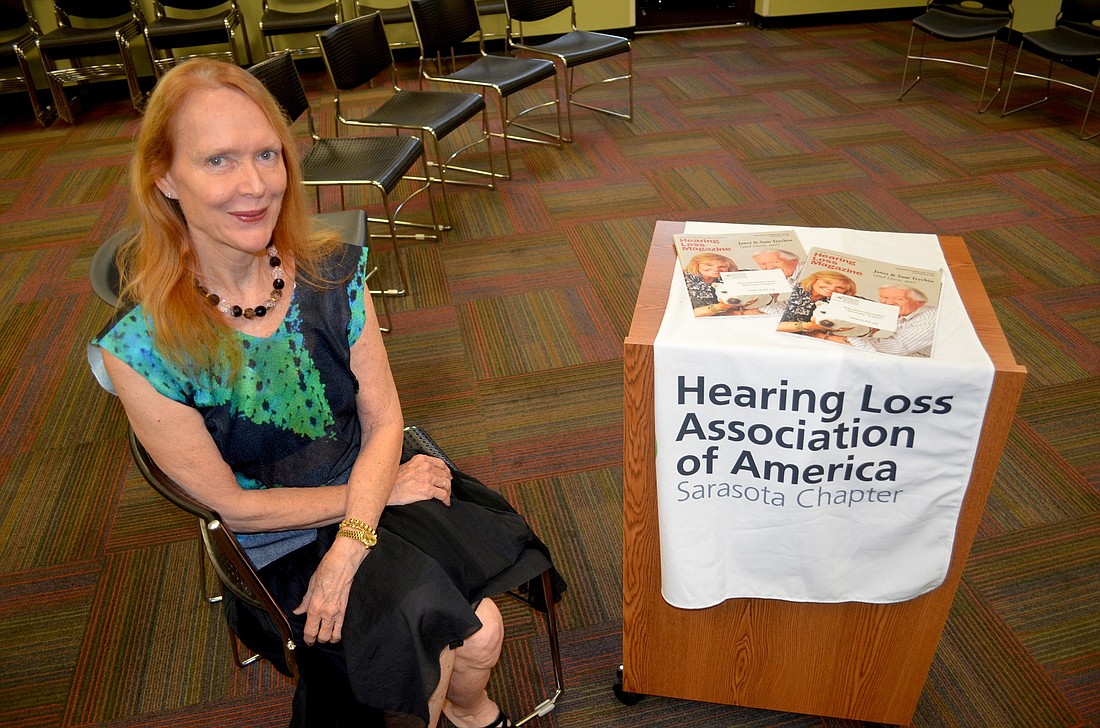- April 24, 2024
-
-
Loading

Loading

Since she was a child, Valerie Stafford-Mallis has wanted to sing.
Although she suffered from severe hearing loss that worsened in her 20s and thereafter, Stafford-Mallis performed in choir groups and productions such as “Jesus Christ Superstar.”
Her final performances were with the Tampa Bay Opera in the late ’90s.
The director would lead performers on stage from below the audience. But Stafford-Mallis lost her ability to read his lips and relied on her memory to determine which piece the group was performing.
“It was extremely fatiguing and not fair to the other performers at that point,” Stafford-Mallis said. “I was only catching about 25% of the sounds around me.”
Stafford-Mallis, now 60, retired from her singing career to once-a-year karaoke performances at Association of Late-Deafened Adults events. Instead of pursuing her lifelong dream of performance singing, now she’s focused on learning more about hearing loss and the resources available to those who have the condition.
After becoming a member of the Hearing Loss Association of America’s Sarasota/Manatee Chapter a few years ago, Stafford-Mallis has learned more about her hearing condition and how it has affected her socially.
“I was the one who unknowingly piped in during someone else’s conversation at cocktail parties,” Stafford-Mallis said. “Then, I’d just stare at the ground because I was so embarrassed.”
The group offers monthly meetings, which feature experts on managing hearing loss.
“The chapter provides a safe place where people with hearing loss can go and not be the outsiders,” Stafford-Mallis said. “I get support, questions answered and I don’t feel alone.”
She also works for Alternative Communication Services (ACS), which provides voice-to-text and sign language services.
Mallis has been married for 32 years and has struggled with hearing for even longer.
As a child, she had persistent ear infections. Her grandparents and father became hard of hearing at early ages, too.
“We didn’t have services or resources for hearing loss back in the ’50s and ’60s,” Mallis said. “Things were different then.”
Talking on the phone became a struggle for Mallis as she aged. Her hearing decreased to a “profound level,” which meant she couldn’t hear noises under 110 decibels; a healthy human ear can detect noises at 10 decibels. So, she could hear a jack hammer being used next to her but not a baby crying in the next room.
She switched jobs 10 times in nine years because of communication issues with employers.
She received hearing aids in 2007 but noticed little improvement to her hearing.
In 2008, she began to have vision problems and decided to take control of her hearing loss by getting cochlear implants.
The implants don’t restore hearing, but through the microphone, speech processor, transmitter and other tools it uses, users can better hear environmental sounds.
She heard her cat, Maximillion, meow for the first time.
“I was used to my quiet world,” Mallis said. “But we live in a noisy world. If I had known about the technology and the resources and support that are available, my life would have been so different.”
Lifestyle choices can slow or prevent hearing loss.
Maintaining a healthy diet is important, said both Dr. Jack Wazen, director of research at the Silverstein Institute Ear Research Foundation, and JoAnne DeVries, president of the Hearing Loss Association of America’s Sarasota/ Manatee Chapter.
“If you’re diabetic, maintain sugar levels,” Wazen said.
They also recommend limiting rock concerts and headphones.
Advances in technology haven’t left out the hearing-impaired.
A range of devices are available to assist with everyday activities, such as watching movies.
Regal Cinemas theaters, such as Hollywood Stadium 20, offer film-captioned glasses for individuals with hearing issues.
The devices go over glasses and captions are displayed.
Pocket talkers, a device you wear on the neck of a shirt, amplify sounds near the user.
Smart phones offer alternatives to alarm notifications, such as flashing light and vibrations rather than a ringing sound.
Local businesses and agencies, such as Lakewood Ranch Town Hall are “looped.”
That means an electrical magnet has been installed, and a hearing impaired people have a coil they can hook on to their hearing aid. So, when someone speaks into a microphone, the sound moves directly to hearing aid.